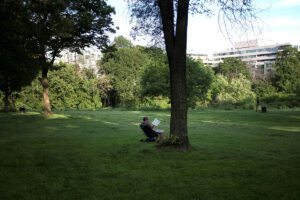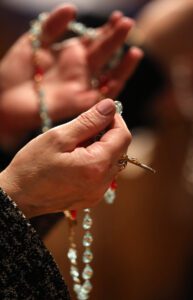(OSV News) – A recent analysis shows 25% of 40-year-olds in the U.S. have never been married – a record high – and may indicate “the closing of the American heart,” according to W. Bradford Wilcox, a sociologist at the University of Virginia and director of the National Marriage Project.
“More and more Americans are headed toward a kinless future, without either a spouse or children of their own,” Wilcox told OSV News. “This particular statistic … is just one more manifestation of the fact that fewer adults are putting a ring on it.”

The Pew Research Center published the statistic and related demographic analysis June 28 after examining 2021 U.S. Census Bureau data. Pew disaggregated the data by sex, race and education. It showed that more men (28%) than women (22%) had never married by 40; that more Blacks (46%) than Hispanics (27%), whites (20%) or Asians (17%) had never married by 40; and that more people with a high school education or less (33%) had never married by 40, contrasted to people with some college (26%) or a bachelor’s degree or higher (18%).
Cohabitation alone doesn’t explain the rise. According to Pew, most never married 40-to-44-year-olds in 2022 reported not living with a romantic partner — only 22% of them reported cohabitating.
In 1900, 16% of 40-year-olds had never been married, and over the century that share declined to 6% in 1980, when it began to rise again, reaching a milestone 20% in 2010 before jumping to 25% in 2021.
The statistics matter because of the relationship between marriage and happiness, Wilcox said. “In general, folks who are married are about twice as likely to be very happy with their lives compared to their unmarried peers,” he said. “Married folks tend to be more financially secure, less lonely (and) report more meaningful lives.”
The rising number of never-married 40-year-olds reflects the cultural emphasis on delaying or forgoing marriage in one’s 20s to focus instead on education, work or recreation, Wilcox said. However, he added, “I think it’s very unwise for 20-somethings to be kind of indifferent towards their family future,” which is the subject of his forthcoming book, “Get Married,” anticipated from HarperCollins in February 2024.
“Marriage and family are just enormously important for Americans today,” he said, “and yet there’s a kind of cultural ignorance out there about the value of marriage, vis-à-vis the other kinds of goals that tend to get more attention — goals like money, a good job, having enough time on the weekends or the evenings to do what you want to do. To have that freedom for fun things, but not recognizing that for most of us, having a spouse, having children, having eventually grandchildren, end up being a lot more important than the size of our bank account or the prestige or stimulation of our job.”
While the Pew analysis shows what Wilcox called a “crisis in marriage” is most salient for working class, poor and some minority Americans, Wilcox’s research also shows that it is also noteworthy among secular and progressive Americans, he said. Contributing to the crisis is the failure of young men to launch successfully into careers that make them attractive for marriage, and people adopting “a more individualistic view of life, who want to keep their options open,” he said.
“These trends are also concentrated among young adults who are not involved in religious communities and adults who are more progressive in their cultural orientation,” he said. “There’s both a class story that we can think about, as well as a cultural story that is playing out among young women, young men today.”
Religious adults are more likely to be dating and marrying, Wilcox said. And while that’s good news, he’s also seeing a rising number of adults, including Catholics, who are single and yet wish to be married.
“Because of the demographic trends and cultural trends unfolding in the country at large, we can expect, at least for the next decade or so,” he said, “that there are going to be a lot of young adults today, including in the church, who won’t find a spouse and who won’t have children.”
A June 2023 survey about marriage expectations among Millennials and Zoomers (Generation Z) who are in a relationship but not married found that “while the majority are hoping to tie the knot someday, many aren’t in a rush to do it.”
Commissioned by The Thriving Center Of Psychology, a mental health platform, the survey found that two in five of the young adults surveyed think marriage is an outdated tradition, but 83% expect to get married someday. However, 85% do not think marriage is necessary to have a fulfilled and committed relationship, and 73% feel it is “too expensive” to get married in the current economy.
Additionally, 17% are not planning to wed, with 72% in this group saying “they just aren’t interested in it.”
The U.S. Census Bureau data – and the underlying situation – flags a ministry need for singles the church often struggles to meet, said Anastasia Northrop, director of the National Catholic Singles Conference. Singles can feel ignored by typical parish ministries, especially if they no longer fit in the “young adult” category, she said.
Among single Catholics, Northrop, 46, sees men and women who are interested in marriage but haven’t found a spouse, and others who aren’t interested in marriage. She said key reasons Catholics aren’t marrying include making a career core to one’s identity, which also can make motherhood appear unfulfilling for women; a desire for one’s own comfort and protection from a broken heart; the availability of sexual intimacy outside of marriage; pervasive individualism; commodification of the person through the perception of endless or unrealistic choices for partners, exacerbated by dating apps; and the idea that relationships shouldn’t require sacrifice or struggle.
Northrop, who is single, founded the National Catholic Singles Conference in 2005 to help single Catholics receive faith formation, socialize and seek holiness in their state of life. This year’s conference, the National Conference for Single Catholics, is Aug. 25-27 in Plymouth, Michigan, and online.
The upshot to the rising number of never-married 40-year-olds may mean that for the 40-year-old single, “there’s other people in the same boat” and “there’s hope you can actually find somebody,” she said.
“The key is that we need to maybe shift our expectations about who we’re looking for (and) make sure we have the right items on our checklist, and our checklist shouldn’t be too long,” she said. “If we look at it as far as encountering a person like, who is this unique individual made in the image and likeness of God – this unrepeatable person – instead of saying, ‘Alright, I’m going to talk to this person for five minutes and, oh well, I don’t feel a lot of fireworks, so I’ll move on.'”
Meanwhile, the church needs to do a better job at helping singles of different ages feel like they belong in parish life, whether or not they want to marry, Northrop said. She recommends single Catholics not wait for their parish or diocese to provide single-focused events, but instead work to build community and share their gifts.
“We are all called to love. We’re made with the vocation to love. We are all called to holiness,” she said. “I always encourage people that are single to work on yourself and your own healing and growth, and becoming who you were created to be.”
In San Diego, Nancy Wesseln has created what she considers an ideal Catholic singles group, in part by not creating a singles group. Instead, her ministry — which is supported by three parishes but draws hundreds of Catholics from across the region — curates hospitality focused social, formation and worship activities for different age groups, where single, widowed, married or divorced Catholics can find community.
“We need to know that there’s others that believe what we believe, in our society that we live in now,” said Wesseln, 62, who is single. San Diego Catholic Adult Community’s online calendar includes opportunities for hiking, bonfires, beach walks and service activities, as well as “Holy Hour and dinner” and “Theology Uncorked.” Each event indicates participants’ age range, with some overlapping events. All events prioritize socializing.
Some friendships formed through the San Diego Catholic Adult Community have resulted in marriage, and Wesseln thinks in-person events are better than dating apps. She hopes in the future to add speed dating to the event mix. “I really believe our young people don’t even know how to date,” she said.
Wesseln’s approach with the San Diego Catholic Adult Community tracks with Wilcox’s recommendations for how religious and cultural institutions can address the rising share of singles – both by creating opportunities for marriage-minded singles to find a spouse, and to integrate all singles into community.
For Catholics, “we have to be more intentional about creating intergenerational and small-group activities that integrate Catholic families or Catholic singles,” Wilcox said, “so that people who are single, often through no deliberate choice of their own, can be incorporated into the other forms of community and in the church.”

